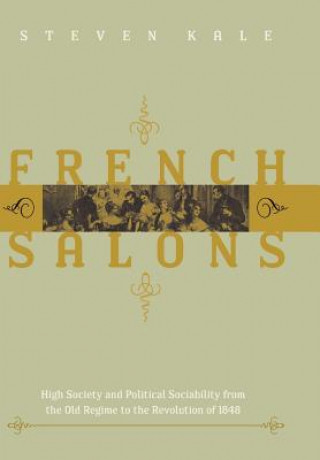
Kód: 04709363
French Salons
Autor Steven Kale
Among the most enduring of French cultural institutions, the salon, is among the most misunderstood. Seen primarily as a venue for apolitical social gatherings, the salon's influence is generally believed to have ended during the ... celý popis
- Jazyk:
 Angličtina
Angličtina - Vazba: Pevná
- Počet stran: 320
Nakladatelství: Johns Hopkins University Press, 2004
- Více informací o knize

1741 Kč

Skladem u dodavatele v malém množství
Odesíláme za 10-14 dnů
Potřebujete více kusů?Máte-li zájem o více kusů, prověřte, prosím, nejprve dostupnost titulu na naši zákaznické podpoře.
Přidat mezi přání
Mohlo by se vám také líbit
-

Single Currency and European Citizenship
6103 Kč -

Perspectives on Biomarker and Surrogate Endpoint Evaluation
1402 Kč -

Fathers and Daughters in Gower's Confessio Amantis
3576 Kč -

Do the Blind Dream?
341 Kč -

Finding Jesus
250 Kč -

Sportbike Performance Handbook
580 Kč -

Theory and Practice of African Politics
1798 Kč
Darujte tuto knihu ještě dnes
- Objednejte knihu a zvolte Zaslat jako dárek.
- Obratem obdržíte darovací poukaz na knihu, který můžete ihned předat obdarovanému.
- Knihu zašleme na adresu obdarovaného, o nic se nestaráte.
Více informací o knize French Salons
Nákupem získáte 174 bodů
 Anotace knihy
Anotace knihy
Among the most enduring of French cultural institutions, the salon, is among the most misunderstood. Seen primarily as a venue for apolitical social gatherings, the salon's influence is generally believed to have ended during the French Revolution. In French Salons, Steven Kale challenges conventional thinking about the salon. Drawing on an impressive range of primary sources, he offers a nuanced history of this institution from the eighteenth century through the Revolution of 1848 which emphasizes continuity and evolution over disjuncture and highlights its shifting political character and relevance. Salons, Kale shows, originally provided opportunities for the exchange of literary and philosophical ideas among the French aristocracy. Central to the maintenance of salon culture were salonnieres, aristocratic women such as Madame de Stael who opened their homes to fellow elites and nurtured a sociability that united the members of high society. Salons provided ready-made venues for aristocratic politics during the early years of the French Revolution, when salons were transformed into places where the upper classes could express their political opinions and concerns. Even at the height of the Terror, salons did not dissolve but, rather, were displaced as aristocrats moved their social networks of influence to such cities as Coblenz, Brussels, and London. Napoleon sought to manipulate salon culture for his own ends, but with his fall from power, salons reemerged and proliferated. Although never intended to serve as political clubs, salons became informal sites for the cultivation of political capital and the exchange of political ideas during the Bourbon Restoration and the July Monarchy. By 1848, the conditions that sustained aristocratic sociability declined, and salons became increasingly marginal to French public life. At the same time, new political institutions-parties, the press, legislative bodies-emerged that more effectively disseminated and shaped political opinion and led to real political change. Challenging many of the conclusions of recent historiography, including the depiction of salonnieres as influential power brokers, French Salons offers an original, penetrating, and engaging analysis of elite culture and society in France before, during, and after the Revolution.
 Parametry knihy
Parametry knihy
Zařazení knihy Knihy v angličtině Humanities History Regional & national history
1741 Kč
- Plný název: French Salons
- Podnázev: High Society and Political Sociability from the Old Regime to the Revolution of 1848
- Autor: Steven Kale
- Jazyk:
 Angličtina
Angličtina - Vazba: Pevná
- Počet stran: 320
- EAN: 9780801877292
- ISBN: 0801877296
- ID: 04709363
- Nakladatelství: Johns Hopkins University Press
- Hmotnost: 544 g
- Rozměry: 229 × 152 × 23 mm
- Datum vydání: 08. June 2004
Oblíbené z jiného soudku
-

Hundred Years' War on Palestine
356 Kč -

Ethnic Cleansing of Palestine
378 Kč -

History of Japan
405 Kč -

Ten Myths About Israel
341 Kč -

Strange Death of Europe
433 Kč -

Decline and Fall of the Roman Empire
130 Kč -

Secret History
320 Kč -

God's Playground A History of Poland
1700 Kč -

Mayflower
388 Kč -

How to be a Victorian
303 Kč -

Plantagenets
357 Kč -

General's Son
426 Kč -

Iran: A Very Short Introduction
250 Kč -

Temples of Karnak
3798 Kč -

Cuneiform
276 Kč -

Twenty Years A-Growing
250 Kč -

China in Africa
906 Kč -

History of Witchcraft in England from 1558 to 1718
460 Kč -

Bohemian Paris
415 Kč -

Islandman
250 Kč -

Lancaster And York
490 Kč -

Alexiad
427 Kč -

Inside Hitler's Greece
518 Kč -

Modern France: A Very Short Introduction
283 Kč -

Diana: Her True Story - In Her Own Words
323 Kč -

The Fourth Turning
393 Kč -

The Oxford History of Ancient Egypt
384 Kč -

Churchill: The Power of Words
433 Kč -

Palestine
564 Kč -

Korean History in Maps
708 Kč -

Great Gatsby (Wisehouse Classics Edition)
408 Kč -

Viking Way
1145 Kč -

The Thirteenth Tribe
309 Kč -

My Promised Land
378 Kč -

Vanished Kingdoms
542 Kč -

Age Of Revolution
410 Kč -

Life and Death of Anne Boleyn
585 Kč -

Coming of the Third Reich
464 Kč -

Children of Ash and Elm
464 Kč -

Europe Between the Oceans
798 Kč -

Socialism Betrayed
478 Kč -

303 Squadron
464 Kč -

Ancient Celts, Second Edition
656 Kč -

Dancing in the Glory of Monsters
396 Kč -

Battle of Britain: Luftwaffe Blitz (Images of War)
606 Kč -

Age of Confucian Rule
851 Kč -

Beyond Band of Brothers
410 Kč -

Benjamin Franklin
410 Kč -

On China
487 Kč
Osobní odběr Praha, Brno a 12903 dalších
Copyright ©2008-24 nejlevnejsi-knihy.cz Všechna práva vyhrazenaSoukromíCookies


 Vrácení do měsíce
Vrácení do měsíce 571 999 099 (8-15.30h)
571 999 099 (8-15.30h)